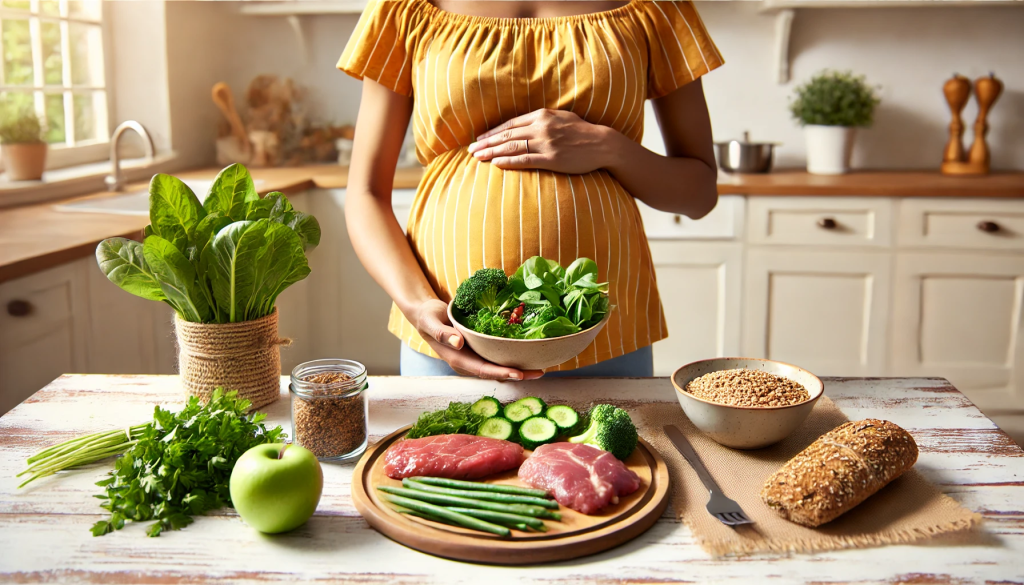A healthy diet for pregnant women plays a vital role in ensuring the proper growth and development of the baby, as well as maintaining the mother’s health. This article outlines how to create a balanced diet that meets all the needs during pregnancy.
1. Proteins – The Building Blocks of Life
Proteins are essential for the development of the baby’s cells and tissues. Include lean meat, chicken, fish, eggs, and plant-based protein sources like legumes, nuts, and seeds in your diet. These help provide the baby with essential building materials.
Proteins are vital for the baby’s growth, particularly in developing cells, tissues, and organs. Pregnant women should consume about 75-100 grams of protein daily.
Foods to Include:
- Animal-based: Chicken, turkey, lean beef, fish (low mercury options like salmon and cod), eggs, and low-fat dairy (yogurt, milk, cheese).
- Plant-based: Lentils, chickpeas, black beans, tofu, edamame, nuts (almonds, walnuts), and seeds (pumpkin seeds, chia seeds).
2. Iron and Folic Acid – Prevent Anemia and Support Development
To prevent anemia and support the baby’s nervous system development, incorporate iron-rich foods (red meat, spinach) and folic acid sources (leafy greens, citrus fruits, whole grains). Iron is best absorbed with vitamin C, so pair your meals with fresh fruits and vegetables.
Iron is crucial for producing hemoglobin, ensuring both mother and baby get enough oxygen. Folic acid prevents neural tube defects in the developing fetus.
Calcium and Vitamin D are necessary for the baby’s skeletal development and maintaining the mother’s bone health.
Foods to Include:
- Calcium-rich: Milk, yogurt, cheese, fortified plant-based milk (almond, soy), broccoli, bok choy, almonds, and tofu.
- Vitamin D sources: Fatty fish (salmon, mackerel), fortified milk and cereals, egg yolks, and mushrooms.
Foods to Include:
- Iron-rich foods: Red meat, poultry, spinach, kale, iron-fortified cereals, and beans.
- Vitamin C-rich foods (to enhance iron absorption): Oranges, strawberries, bell peppers, and tomatoes.
- Folic acid sources: Dark leafy greens (spinach, arugula), avocados, broccoli, asparagus, lentils, and fortified whole grains.
3. Calcium and Vitamin D – For Strong Bones and Teeth
Calcium is crucial for the baby’s bone and tooth development. Include dairy products like milk, yogurt, and cheese, as well as calcium-fortified plant-based drinks, almonds, and broccoli in your meals.
Calcium and Vitamin D are necessary for the baby’s skeletal development and maintaining the mother’s bone health.
Foods to Include:
- Calcium-rich: Milk, yogurt, cheese, fortified plant-based milk (almond, soy), broccoli, bok choy, almonds, and tofu.
- Vitamin D sources: Fatty fish (salmon, mackerel), fortified milk and cereals, egg yolks, and mushrooms.
4. Omega-3 Fatty Acids – Brain and Vision Development

These fats are critical for the baby’s brain and vision development. Sources of omega-3 include fish (salmon, mackerel), flaxseeds, chia seeds, and walnuts. Ensure you choose fish with low mercury levels.
Omega-3 fatty acids, especially DHA, support the baby’s brain and vision development.
Foods to Include:
- Fatty fish (salmon, sardines, trout), walnuts, flaxseeds, chia seeds, and omega-3 fortified eggs.
- Supplements: Prenatal vitamins with DHA can be added if dietary intake is insufficient.
5. Healthy Carbohydrates – Sustained Energy
Complex carbohydrates provide energy and help prevent blood sugar spikes. Opt for whole-grain bread, brown rice, quinoa, and oats. Avoid sweets and processed foods.
Carbohydrates are the primary energy source for pregnant women. Opt for complex carbohydrates for sustained energy and stable blood sugar levels.
Foods to Include:
- Whole-grain bread, brown rice, oats, quinoa, barley, sweet potatoes, and legumes (lentils, peas).
- Fruits for natural sweetness: Apples, bananas, oranges, berries, and pears.
6. Hydration – The Unsung Hero

Don’t forget about water! Pregnant women should drink at least 8–10 glasses of water daily. This supports proper blood circulation, prevents swelling, and keeps energy levels up.
Adequate hydration supports digestion, maintains amniotic fluid levels, and prevents fatigue.
Hydration Options:
- Plain water (aim for 8-10 glasses daily).
- Herbal teas (ginger or peppermint for nausea).
- Fresh fruit-infused water or smoothies.
7. Foods to Avoid – Ensuring Safety
Exclude raw or undercooked foods like eggs and meat, unpasteurized dairy products, and foods high in sugar, salt, and unhealthy fats from your diet.
Some foods pose risks to the baby and should be avoided:
- Raw or undercooked meat, fish, and eggs.
- High-mercury fish like shark, swordfish, and king mackerel.
- Unpasteurized dairy products and juices.
- Processed foods with high levels of sugar, salt, or unhealthy fats.
Sample Daily Menu for Pregnant Women
- Breakfast: Scrambled eggs with spinach and whole-grain toast, a glass of fortified orange juice.
- Snack: A handful of almonds and a banana.
- Lunch: Grilled salmon, quinoa salad with kale, and steamed broccoli.
- Snack: Greek yogurt with fresh berries and a sprinkle of chia seeds.
- Dinner: Grilled chicken breast, sweet potato, and roasted asparagus.
- Hydration: Water or herbal tea throughout the day.
Conclusion
A healthy diet during pregnancy ensures the well-being of both mother and baby. By including these nutrient-rich foods and following safe dietary practices, expectant mothers can provide the best foundation for their baby’s growth and development. Always consult with a healthcare provider or dietitian for personalized nutritional advice.
















